The 2017 AOA Startup Grant winner
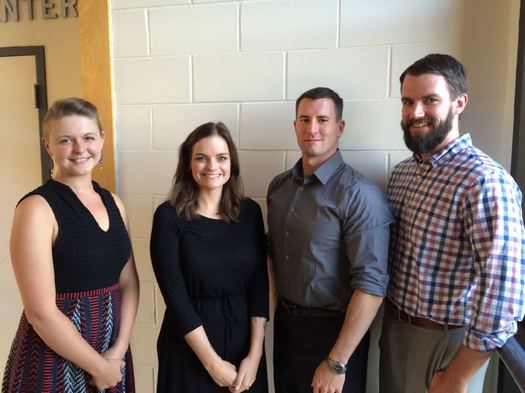
Over the years we've had many good projects make the finals of the AOA Startup Grant. But after the judges have had the chance to hear the presentations, they usually come to a consensus quickly.
Not this year. Three very strong projects made their pitches at the College of Saint Rose Wednesday and the judges had a tough time settling on a winner. The post-presentation discussion was long and more than a little bit agonized. But they finally picked a winner -- in a split decision.
Judges
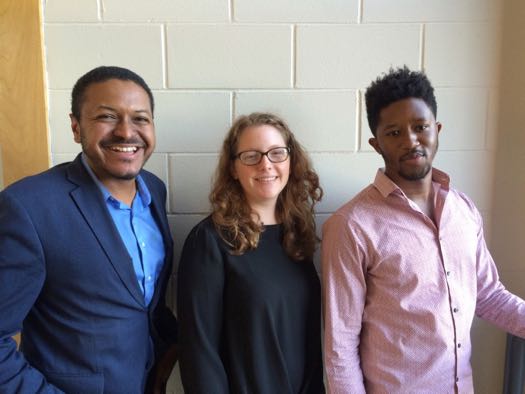
Left to right: Joe Bonilla, Rhea Drysdale, Johan Matthews.
The judges for this year's contest:
+ Rhea Drysdale: CEO of the marketing firm Outspoken Media.
+ Joe Bonilla: managing partner of the public relations and events firm Relentless Awareness.
+ Johan Matthews: a training and technical assistance associate with the Community Loan Fund of the Capital Region.
Here are a few thoughts on each of the finalists' projects, along with a few bits of advice...
Adirondack Barnwood Salvage
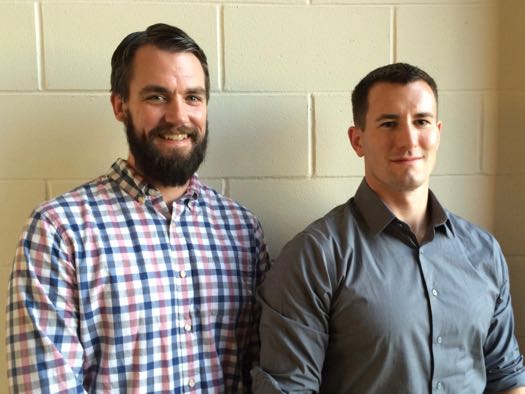
Nicolas Ouimet and Adam Weber
Nicolas Ouimet and Adam Weber have an early-stage business that takes apart old barns, salvages the wood, and the sells the materials. ABS was the editors' pick for the final.
Ouimet on the key to their business:
I think the key to our business is really going to be interacting with the different three levels of customers we're going to have -- the whole, contractor, and artisan levels. If we just picked one, it really limits the market. The volume is going to go to our wholesalers, but the money per board foot per piece of material is higher at the lower end. So we've gotta make sure we're targeting all three of those areas as we move forward and not limit our market.
They would use the grant money for equipment to speed the process of taking apart the barn on which they're currently working.
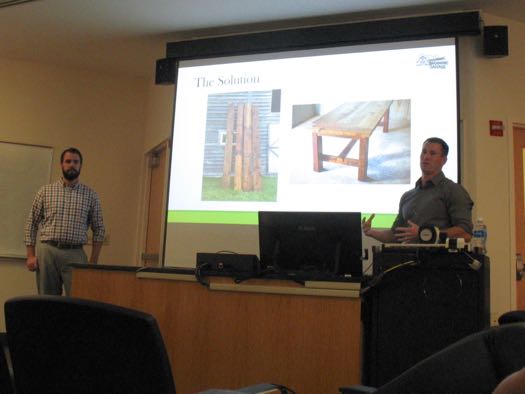
Judges' thoughts
The judges were big fans of the concept -- they really liked the idea of a business that would be involved in recycling and repurposing old materials. They also had the praise for the ABS presentation, which they said demonstrated understanding of the market and the segments within the market. As one judge commented, Ouimet and Weber know how to sell the idea.
They did have some concerns, though. The first was about how labor intensive it might be to take apart these old barns -- and the safety and insurance measures necessary for that work. The second was a question about just how many barns there might be in this region that will be available. And the third was the business still is in its very early stages.
Judges' advice
+ Formalize the process of assessing barns so they can have a better sense of how much labor will be involved to take it apart, and what the potential payoff of the materials will be.
+ Approach barn acquisition more strategically and move beyond the casual process they've been using.
+ Get some assets, specifically machinery that they can own rather than rent.
+ Think about how they document the various stages of what they do online and use that as marketing.
+ Go all in.
Olive & June Floral Co.
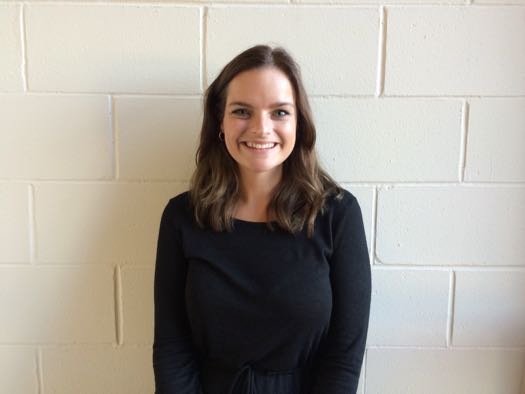
Cassie Vogel is planning to open a counter for her growing floral business inside the Fort Orange General Store in downtown Albany. Her project placed second in the crowd voting to claim a spot in the final.
Vogel's thoughts on the key to her business:
I think the key to my business is remembering the core values of my business, which are centered on a foundation of personal relationships. That's how you retain a client, that's how you connect with your community. And, really, that's how I think can create a beautiful product for people when I actually care about them, care about their wedding, care about their anniversary, or whatever I might be making for them.
She would use the grant money to pay for the build out of her counter in the FOGS.
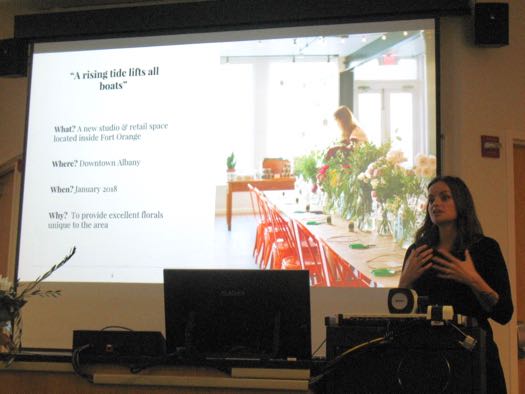
Judges' thoughts
The judges like that Vogel appeared to planning manageable steps for growing her business and wasn't taking on an entire space of her own yet. They thought using the grant money to build out the counter in the store would be a good use of the money. The judges also praised Vogel's apparent ability to build relationships with customers and other businesses, such as dress shops. And they were happy to see that she wanted to be in downtown Albany.
The also had a few concerns. One that immediately popped up in the post-presentation conversation the similarity of Vogel's business to Flower Scout and whether there was room for both of them in the local market. (Vogel said in her presentation that she and Colie Collen, the owner of Flower Scout, had already been referring people to each other.) More crucially, the judges also expressed concern about the possibility of burnout given Vogel's plans to do weddings, workshops, and flower deliveries. And they thought she needed to do more work in getting a grip on the financial numbers of her business.
Judges' advice
+ Streamline the offerings. Does everything make sense right now as part of the business? Narrow the focus on what makes money.
+ Build a plan for a success. If her bookings take off quickly, have a plan for how to add capacity and people to help.
+ Learn the financials inside and out.
Bard & Baker: Board Game Cafe
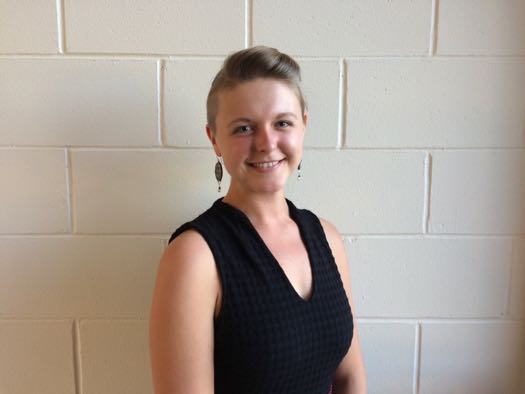
Charlotte Guyton is planning to open a board game cafe in downtown Troy next year. She won the crowd voting by a healthy margin to claim a spot in the final.
Guyton's thoughts on the key to her business:
The key to the business for Bard & Baker is people. It's all about the people, whether it's the community or the guests who frequent our space, to the vendors we support and the local businesses with which we collaborate. We can not do what we do without the local community.
Guyton would use the grant money to buy games for the cafe.
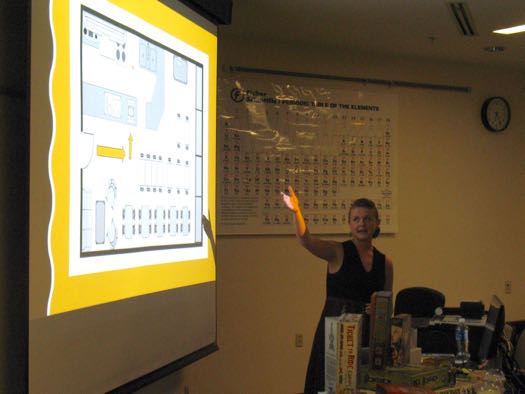
Judges' thoughts
The judges were fans of Guyton and her experience as general manager for Clark House Hospitality (owner of Peck's Arcade and its related businesses). They also thought her presentation was spot on. And they appreciated that she had a business plan. As one judge commented, even if the plan changes -- and it always does -- the fact that she has a plan already demonstrates she has the skills to work through the changes.
Their concerns centered first and foremost on the nature of this sort of business. Cafes require a lot of foot traffic to stay alive, and the judges we were a little worried that projections in the plan were maybe a bit too optimistic. They also thought the proposed menu of cafe offerings was probably too long and involved, which could increase labor costs and wait times for customers.
Judges's advice
+ Don't become too in love with the board game cafe concept itself. Guyton and her team have talent and experience, they shouldn't be afraid to pivot if something isn't working.
+ Think about how to use the planned pop-ups to take some small risks in order to figure out what works and doesn't.
+ Pare down some of the initial plans for the menu, drinks, and the model itself. You can build up based on what's working.
And the winner is...
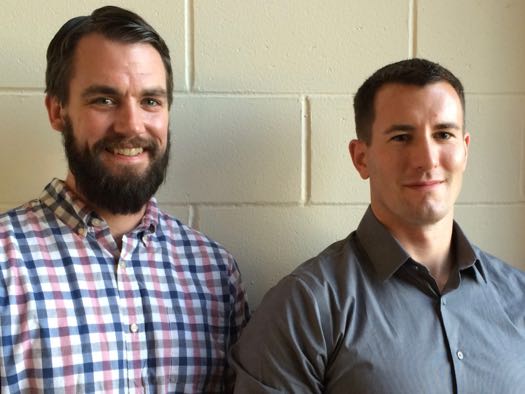
Adirondack Barnwood Salvage
It takes the $2,500 cash prize. Congrats!
This wasn't a selection the judges arrived at easily. The discussion was probably the longest we've ever had among the judges in the final. And as mentioned above, the decision was split 2-1.
What finally got two of the judges to settle on Adirondack Barnwood Salvage was the business model, even if it's currently underdeveloped. One commented that it was good see a project that could provide some form of economic activity in rural areas. And the two judges who ultimately voted for ABS were also swayed by the research Nicolas Ouimet and Adam Weber had done into the business, their apparent knowledge of the industry, and their ability to sell the idea to different audiences -- even at this early stage.
Now it's a matter of executing and scaling the plan. And they judges were optimistic Ouimet and Weber are capable of that.
But wait, there's more...
The two runners-up in this year's contest don't leave empty handed. The Community Loan Fund has graciously offered each of them free admission to its entrepreneurship class.
Thank you
Thank you to everyone who submitted an application for this year's grant. There were some very strong projects this year -- more than could fit in the final. Please keep us updated as you make progress!
Big thanks to John Dion from the Huether School of Business at the College of Saint Rose for again providing coaching to this year's finalists. John is a very encouraging presence for the finalists and we appreciate his involvement.
And thank you to this year's judges: Rhea Drysdale of Outspoken Media, Joe Bonilla of Relentless Awareness, and Johan Matthews of the Community Loan Fund of the Capital Region.
____
The 2017 AOA Startup Grant is made possible with the help of CDPHP, CDTA, the College of Saint Rose, Nine Pin Cider, and the Community Loan Fund of the Capital Region.
Hi there. Comments have been closed for this item. Still have something to say? Contact us.




Comments
Congratulations to the winner, and the finalists! Well done, everyone. Looking forward to following all these entrepreneurs as their businesses bloom and grow.
... said A Cuozzo on Oct 6, 2017 at 7:36 AM | link